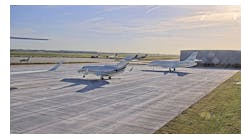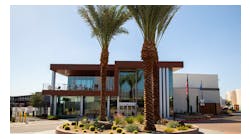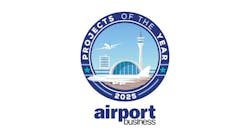FBOs Make a Strong Case for Increasing Charter, Flight-School Business, Other Service Offerings
Thomas Aronson, 30, would drive up to eight hours to meet with customers. “I’d be on the road three days a week meeting with three customers. Now I meet with all three in one day,” he said. The game changer: private aviation.
Aronson is president of the Aronson Group, a Bettendorf, Iowa, risk management insurance agency that specializes in transportation fleets such as semitrucks.
“I recently made the same trip by chartering a Carver Aero King Air 200 from the Davenport FBO and flew to Minnesota,” said Aronson. “My first stop was to meet a customer in Winona. I then flew to Aitken where I had lunch with a second customer and the third leg of the trip was to Rogers where I met with another customer. I was back home for dinner with my family that evening.”
The $5,500 charter “paid for itself in spades,” said Aronson.
Here’s how. Aronson says you take 30% off the top that would have gone for federal income taxes, which brings the actual cost of the charter to $3,850. Then you factor in the cost of gas, vehicle maintenance, hotel and meals. Lastly, you factor in the loss of business. “I’ve eliminated two days of traveling and I’m in the office making calls and conducting business. Now we’re past the break-even point because I know how much business we conduct each day based on total income from previous years.”
On the personal side, he wins. “I’m with my family. We have two young children. I get to spend more time with them and help my wife,” he said.
“When Tom came to Carver Aero, he first was looking at purchasing a plane,” said Julie Marrella, director of charter sales. “He’s in risk management and he saw what his clients did to reduce their tax liability. They bought assets, and he thought he should do the same.”
At the end of the day, Aronson believed chartering was the better way to go. “I decided on Carver Aero because they were minutes from my house. I can drive my car right up to the plane, hop on and off we go.”
According to IBIS World, prior to the pandemic, charter flights increased at an annualized rate of 1.8% to $25.2 billion over the five years to 2020.
Sandra Barrett, director of operations at Carver Aero’s Davenport FBO, said charter sales have increased during the pandemic. “It fell off in March and April of 2020, but it picked back up in May and continued to make a strong comeback progressively throughout the year and into 2021,” she said.
Future of Private Aviation is Taking Off
Joshua Diggs, district manager for Avfuel, confirmed that Part-135 fuel consumption in the Midwest “had a good, solid year” in 2020. “Many of our Part-135 customers had a record number of new customers, and many saw flat or slight increases over 2019 numbers, particularly with those who have disposable income, but didn’t previously consider private aviation for their transportation needs. Rather than experience declines during the pandemic, we saw Midwest FBOs that cater to GA traffic remain stable, and many even experienced an upward trend in volume of new customers compared to 2019.”
Most of our FBOs had a record number of new customers and most saw flat or slight increases over 2019 numbers,” particularly with people with disposable incomes.
There are about 8.2 million households in the United States with a net worth of $2 million or more, one charter jet executive was quoted in a July 2020 Forbes article. “The majority of them weren’t flying private before,” he said. “We are seeing a huge shift in that narrative now it is a health and safety concern.”
Carver Aero CEO Guy Lieser agrees, saying, “We did a thorough survey in late 2020 and we are seeing an increase in charter and pilot services, partly because of COVID-19, but also because people want to fly out of their local airport on their own schedule and land at an airport nearer their destination. The airlines only service 500 airports nationwide. A chartered aircraft will fly into an additional 14,500 airports.”
Lisa LaMantia, senior vice president of national services for Carver Aero and former owner of Advanced Air in Council Bluffs, said one of the biggest changes she witnessed during the pandemic was that people from all walks of life wanted to learn to fly for different reasons. “Some had always wanted to fly but didn’t have the time. Others saw it as the future for their corporate travel,” she said. “The younger generation realizes that there is and will continue to be a shortage of commercial pilots throughout the decade, so why not jump in now?”
Carver Aero, which currently operates FBOs in Davenport, Muscatine and Council Bluffs, Iowa, is expanding in the Midwest, said Lieser. “We’re looking at acquiring additional FBOs in Nebraska, Illinois and Wisconsin this year,” he said. “As a result, we’re simultaneously looking at rebranding the company.”
The pandemic gave FBO operators little choice, said Nicholas Daddis, founder and president of FBO Advisors, which has offices in Arizona, Colorado and Illinois. “The FBO operators had to become more efficient and more lean out of necessity while still managing to providie continued great service.”
Daddis believes these operators are poised to reap the economic benefits of those efficiencies that they were forced into. “Another major shift that we’ll see at FBOs is maximizing hangar rental. It’s a major recurring income center alongside the traditional fuel sales,” he said. Well located FBO’s are experiencing record fuel sales, compared to the same period last year, which were affected by the pandemic. Some of our clients are reporting four times the fuel sales during this current quarter. “I don’t believe there’s ever been a better time to be in general aviation,” he said, “We’re back.
Lieser said Carver Aero will be adding additional hangars in Council Bluffs and future FBO locations as well. “It’s certainly a part of our strategic growth plan,” he said.
Carver Aero is also making a dramatic shift in how FBOs are viewed in their communities. “We want to be more active,” said Lieser. “We want to host events at the FBO.” He said events could include air shows, the hosting of exhibits featuring local artists or incorporating a restaurant where families can enjoy a burger while watching planes take off and land. “We want families to enjoy aviation and for young people to experience the wonderment of flight,” he said.
From Accounting to Aviation
Cameron Frazier, 24, is one of those young people who made a 180-degree change in his life. Frazier worked as an auditor for a public accounting firm in Des Moines upon graduating from college.
“I really didn’t like it,” he said. “When we visited clients, I was often given a desk in a windowless, basement office, and I’d sit there for 12 hours.”
When Frazier began studying for his Certified Public Accountant exam, he had an epiphany. “I wasn’t passionate about it, and if you really dislike something, it’s not easy to study several hours a day for an exam.”
Frazier said he turned to his younger self to see what interested him besides numbers. “I remember as a kid, my dad took me to an air show and I saw the Blue Angels, and I thought that would be an awesome career.”
He researched becoming a Blue Angel and opted to take the civilian route instead. “I quit my job and started pilot training. I practically lived at the airport and put my full attention to it.” Frazier got his pilot’s license in 30 days and then proceeded with various ratings through multi-engine flight instructor.
“I’m a flight instructor but do help on the charter department when they need someone in the right seat,” he said. Frazier is working toward 1,500 hours to earn his Airline Transport Pilot (ATP) license.
The biggest changes he’s experienced? “I really enjoy what I do now. I have a passion for it, and it provides a better work-life balance.
“A 12-hour day in aviation goes by really fast, whereas 12 hours in accounting does not,” he adds.
Charter customer Aronson says, “It’s the best big-purchase decision our agency has made. Being able to leave town, go five hours away and get back the same day is invaluable to me. I don’t come from a family of high material wealth, but chartering a plane has reopened my eyes to see this is the way to travel. It’s like a time machine and certainly safer than driving on all those two-lane roads I used to drive.”
From a business perspective, it’s all about the presentation. “When we landed in Winona, our client met me at the airport. He was overwhelmed and impressed with the plane,” said Aronson. “I got off the plane in my suit, the client was able to check the plane out, and he appreciated the whole experience."
Roderick Kelly is the Marketing Manager for Carver Aero.




